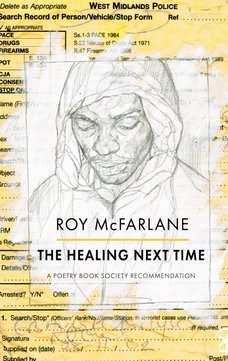
Before I embarked upon writing this review, I had only read the words on the page. However, recently I had the very great privilege of hearing some of the work read by Roy himself at an event in Mid Wales. When I say read, what I really mean is delivered with the gusto of a spoken word artist and the passion of someone who clearly cares deeply about its content. Roy powered his way through the most convincing performance which actually helped me feel the poetry all the better.
The first part of this collection uses the device of listing significant world events from 1999 to more recent times, as a kind of annotated diary McFarlane calls New Millennium Journal, alongside the lives of real or imagined characters referred to as ‘the activist’ and ‘the family man’. The former is presented as a worthy, political type determined to fight prejudice and expose police brutality whilst being a force for change and radical new thinking. The latter is presented as a weak man unable to resist the sexual charms of an adventurous and willing lover. For this cheating husband, “only the gravitational pull of his children draws him away from the black hole of his guilt.” Between the two of them, we are escorted through a familiar backdrop, including the fears about the Millennium Bug in 1999, the horror of the attack on the twin towers in 2001, the Boxing Day tsunami in 2004, various football World Cups and the earthquake closer to home in Dudley in 2002. In their different ways, these stand as metaphors for the extraordinary racism blighting our nation during this period. McFarlane unravels this social history in our faces, just as the marriage of ‘the family man’ unravels and ‘the activist’ spends “summers in the discomfort of whiteness.”
In the second part of the collection, McFarlane lists the names of eighteen black men and women who have died in custody. He uses the constriction of the sonnet form, maybe to echo the constraint used to hold down the detained. He utilises repetition such as “and nobody came” in Orville Blackwood 1999 and the visually graphic “whyyyyy?” as in Shiji Lapite 1994. McFarlane also experiments with the shape of the poem on the page, suggesting a bullet in Cherry Groce 2011 and a winged angel in Mark Duggan 2011. There is wonderfully chilling play on the word ‘tape’ in Joy Gardner 1993, where McFarlane throws sticky tape, mix tape, tape measure, red tape and even tapestry into the death by suffocation of this victim. The footballing imagery is obvious but still effective in Dailian Atkinson 2016 where “there’s no extra time” for the young man who dies. You cannot fail to be moved by this litany of gruesome death, so starkly laid out for us by McFarlane.
In the final section of the book we get the Gospel According to Rasta. Here McFarlane roots the reader in the city of Birmingham. He tells us “in a city of a hundred tongues we should always make room for another one” and he uses dialect to warn us “Dis Rasta rose from the oven-ash of holocaust.” McFarlane challenges us to question the cultural and religious elements we surround ourselves with and asks “Dis Rasta is he fiction or truth?” There is more than a suggestion that we need to speak out about all the injustice, “We are the disciples who beareth witness of these things so write, write it all.”
Throughout the work there are musical and religious references and the recognition that “every woman is somebody’s daughter”. McFarlane has clearly researched his material with great purpose and conviction. What emerges is a kind of rage that the new millennium did not bring with it change and justice, but rather hypocrisy and a dangerous, nasty under-current in society. McFarlane makes startlingly effective use of the idea that hands can be “outstretched to help refugees”, can be a woman’s “hands that worked hard” and a mother placing “her hand on his troubled heart”, just as much as hands “holding a rose in a clenched fist”.
I would be lying if I said there was much hope in this work, apart from in Gabay of hope which urges us to “breathe.” The work is bleak, challenging, angry and exposing. As a relatively privileged white woman living in a rural community, I like many am shielded from these experiences and able to observe them through the lens of the media. McFarlane does something important by using poetry as an unmistakably brutal tool to force me face down and hold me, maybe against my will for a while, where the reality of being black and marginalised is very visceral. I read and enjoyed McFarlane’s last book because it was full of humanity, a deeply emotional read. This latest work is wonderful for its change of pace, for coming from a very different but equally real place. I believe this is poetry shouting serious messages at a time of deep uncertainty. McFarlane shows his broad and remarkable technical skill, his passionate and convincing voice and is destined to disturb his way into our conscience. Go and hear him read from this book and you will feel it too.
The Healing Next Time is published by Nine Arches Press and can be ordered here: http://ninearchespress.com/
Pat Edwards is a writer, teacher and performer from Mid Wales. Her work has appeared in Prole, Magma, Atrium and others. She hosts Verbatim poetry open mic nights and curates Welshpool Poetry Festival.
